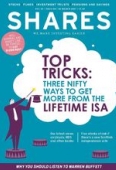Archived article
Please note that tax, investment, pension and ISA rules can change and the information and any views contained in this article may now be inaccurate.
Learn from Buffett’s words of wisdom

The publication of Warren Buffett’s annual Berkshire Hathaway shareholder letter is often treated like a release of a new book from a best-selling author. The media gives it significant publicity and pore over the legendary investor’s every word.
The broader investment community also latch on to Buffett’s annual tome, looking for new insights into how the man became one of the world’s most successful investors. Rightly so. Berkshire has achieved 20.8% compound annual gain since 1965, more than twice the return from the S&P 500 index including dividends (9.7%).
What's in the letter?
Buffett’s honesty in his shareholder letter is refreshing. It always contains a few valuable lessons, showing how you can learn from mistakes, as well as engaging in interesting debates about investing.
Share buybacks are the topic of debate in his latest letter. He’s a fan of them, as long as a company can buy its shares below their intrinsic value. Buffett also raises a good point whereby companies shouldn’t do buybacks if the cash is needed to protect or expand the existing business or when an acquisition could add greater value.
Very few individual companies explain to shareholders why they’ve come to certain decisions such as share buybacks or detail in great length the cash requirements for their existing business.
I believe individual companies should take a leaf out of Buffett’s book and follow his example in explaining why they’ve come to certain decisions. Off the top of my head, retailer Next (NXT) is the only company to actually do this.
Where else can I find good commentary?
You often get a lot more frank discussion from people who run investment companies or funds about their decision making versus individual companies. Anyone serious about investing should take a good look at investment fund reports as they can give valuable insights into why certain decisions were made.
For example, investment company RIT Capital Partners’ (RCP) latest results include a good commentary by chairman Lord Rothschild on how RIT views the world from an investment perspective. The one line that really stood out was: ‘There could well be a period ahead of us when the avoidance of risk is as high a priority as the pursuit of gain.’
Investors often get tunnel vision in the pursuit of making a profit. Rothschild’s comment is a good reminder that you also need to think about other things, particularly to avoid wealth destruction.
This statement is also echoed in Athelney Trust’s (ATY) newly-published results which contains a few pearls of wisdom.
In his latest commentary, Athelney chairman Manny Pohl criticises companies for being short-term in the pursuit of shareholder value, trying to meet market expectations to boost the share price and not focus on investing in the business for the longer-term.
‘What does managing for shareholder value mean? It means managing for cash flow not earnings per share: it means managing for the long-term not the short-term,’ says Pohl.
COMING SOON IN SHARES
In the coming months we’re going to discuss in Shares the best sources of information on investment strategies and explain how they could help make you a better investor.
Until then, I suggest you devour the material from Berkshire, RIT and Athelney. They really are essential reading. (DC)
Important information:
These articles are provided by Shares magazine which is published by AJ Bell Media, a part of AJ Bell. Shares is not written by AJ Bell.
Shares is provided for your general information and use and is not a personal recommendation to invest. It is not intended to be relied upon by you in making or not making any investment decisions. The investments referred to in these articles will not be suitable for all investors. If in doubt please seek appropriate independent financial advice.
Investors acting on the information in these articles do so at their own risk and AJ Bell Media and its staff do not accept liability for losses suffered by investors as a result of their investment decisions.
Issue contents
Big News
Editor's View
Great Ideas Update
Investment Trusts
Larger Companies
Smaller Companies
Story In Numbers
- £24.3bn: Personal pension contributions break new record
- 15.7% jump in UK remortgage approvals in January
- Real Estate Investment Trusts
- FTSE All-Share Sectors
- 66%: Potential jump in IMI’s 2017 earnings per share
- 24%: US worst offender for cyber-attacks
- $6.47bn: Warren Buffett’s costly mistake
- 10 years: First dividend growth in a decade from Intu

 magazine
magazine








